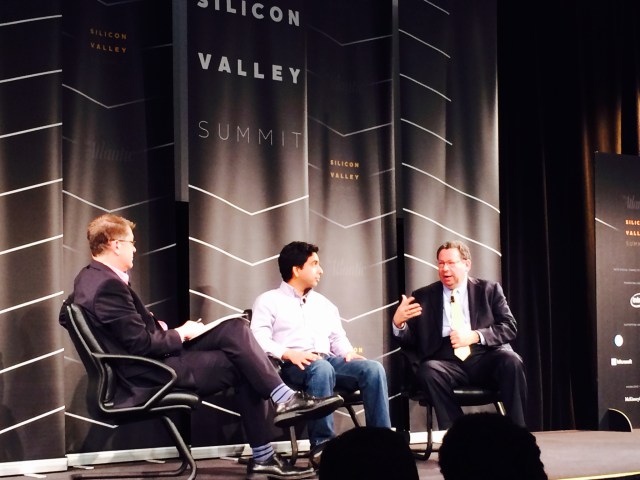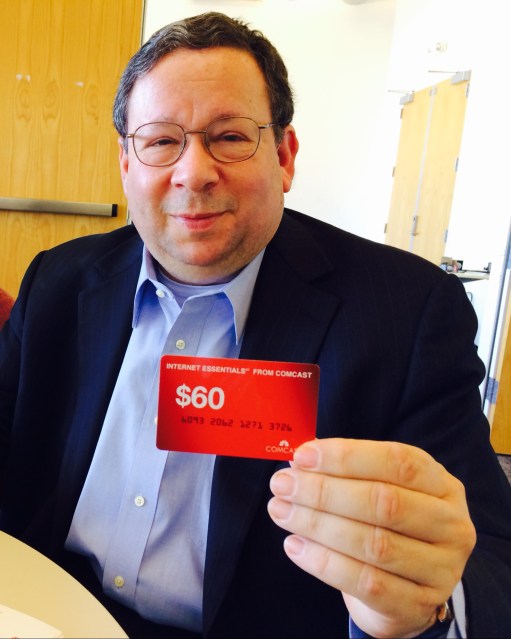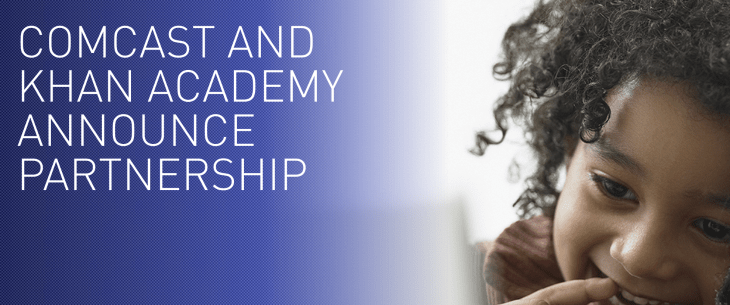Comcast has committed to pumping millions of dollars into a joint partnership with Khan Academy that will pay for product development of its free, online education and promote it alongside Comcast’s cheap broadband access tier Internet Essentials for low-income families. Comcast’s executive VP David Cohen believes that backing Khan Academy will boost digital literacy and get more people paying for broadband because “its content is the ultimate proof point of the value of the Internet.”
Khan Academy co-founder Sal Khan and Cohen announced the new partnership today on-stage at The Atlantic’s Silicon Valley Summit at Mountain View’s Computer History Museum.
Cohen wrote today that “We’re announcing a multi-year, multi-million dollar comprehensive partnership designed to raise awareness…of Khan Academy and…Internet Essentials. This is one of the largest commitments we have made to a non-profit partner and includes a financial contribution, hundreds of thousands of PSAs a year, and significant digital promotion.” Comcast will directly provide funding to help Khan Academy build out its product. Khan tells me this includes creating a suite of full-featured interactive mobile apps next year that go beyond the basic video-watching mobile app it has now.
30% of Americans currently don’t have broadband Internet access. The program is designed to convince families that the Internet is critical to their economic success, with Khan Academy as the poster child for how the web can improve lives. The financial support of Comcast for online education certainly has a philanthropic aspect, but also stands to attract it new $9.95 a month Internet Essentials broadband customers. The program, open to families with at least one child eligible for the federally assisted National School Lunch Program that makes meals more affordable for low-income families.

Cohen explained on stage that “The number one barrier to broadband adoption is digital literacy skills. And Khan academy is the number one solution. We’re going to put the largest allocation of our resources behind Khan Academy and promoting Khan Academy nationally, driving additional hits to that website. And we believe in doing that we’re not only going to give kids and families access to this content… but drive larger broadband adoption in America.”
Khan followed up saying that people need broadband access at home to get the full benefit of Khan Academy. Khan hopes that through programs like this, the whole country will get online and become better equipped to compete in the new global job market.
After Khan and Cohen got off stage, I spoke with them about how the partnership will move the needle for their two companies.
When asked if the drive was just a way for Comcast to sign up more customers, Cohen passionately defended Internet Essentials, saying “When we sell an Internet service for $9.95 that we normally sell for $39.95 to $49.95, we’re not in it for the money. It’s not a great business for us. If you look long-term, it’s community investment priority not a business priority.” He did admit, though, that “In 10, 15, 20 years we’d like to hope this population will be making money and could be Comcast customers…or Time Warner customers, or AT&T customers.”
 Cohen and Khan agreed that once low-income families get a taste of broadband at home, they get hooked, and 98% of users say it helps their kids do homework, while 67% use the web to find information on government assistance programs — both which help them improve their economic situation. So why not just give away the first month of Internet Essentials for free? Cohen says it works better when people value the web, and that Comcast gives out tons of “Internet Essentials Opportunity Cards” that give families up to a year of free service.
Cohen and Khan agreed that once low-income families get a taste of broadband at home, they get hooked, and 98% of users say it helps their kids do homework, while 67% use the web to find information on government assistance programs — both which help them improve their economic situation. So why not just give away the first month of Internet Essentials for free? Cohen says it works better when people value the web, and that Comcast gives out tons of “Internet Essentials Opportunity Cards” that give families up to a year of free service.
But what about mobile? Some believe that low-income communities are leapfrogging broadband access at home in favor of mobile Internet access. But Cohen noted that watching hours of educational video on a phone could rack up enormous charges, so broadband is more affordable for this use case. Khan admitted his academy’s mobile interfaces aren’t quite up to snuff, but he’ll be spending part of Comcast’s investment on fixing that. “One of the major initiatives we’re working on is a fully featured mobile app and tablet app.”
For now, though, Khan encouraged low-income families to check if they’re eligible for reduced price Internet Essentials access, then to go to Khan Academy. There they can take the pre-test to determine their skill level and get suggestions of what education content to start with.
Cohen concluded that while Google’s Project Loon and Facebook’s Internet.org accessibility initiatives are focused abroad, there’s plenty to do at home and as broadband provider, it’s Comcast’s responsibility. “If we don’t focus on broadband adoption, who will? If we’re not putting our money behind this, we can’t expect Exxon-Mobil or Walmart to step up and say ‘we’re going to get America connected.'”
